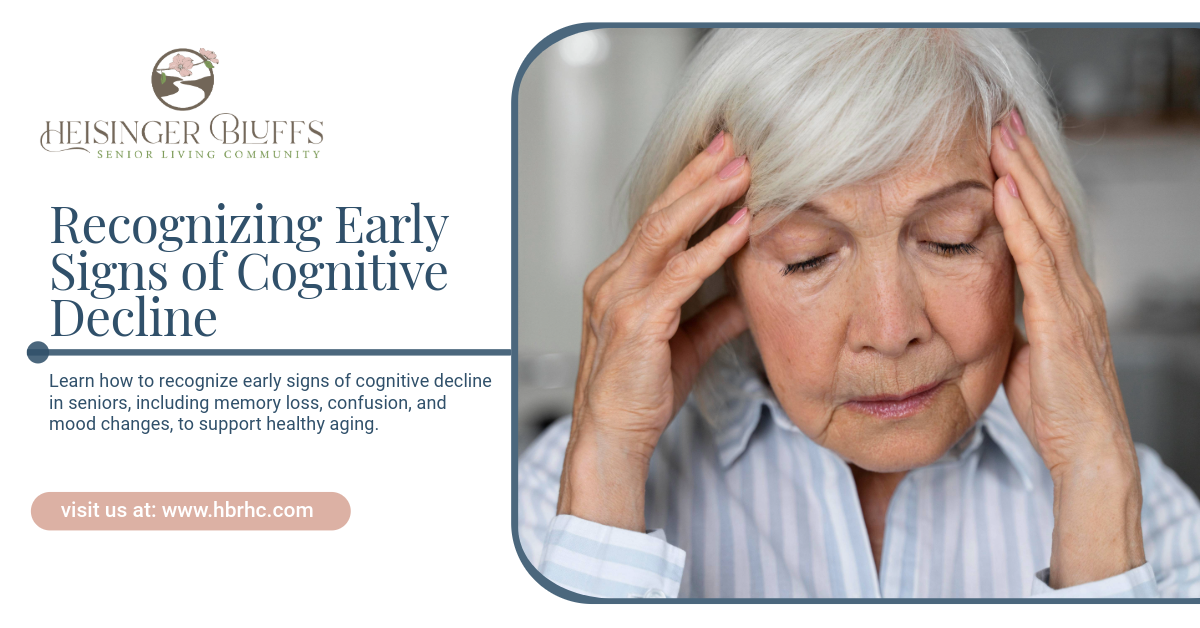Recognizing Early Signs of Cognitive Decline

Cognitive health plays a vital role in maintaining independence, quality of life, and overall well-being for seniors. While occasional forgetfulness is a normal part of aging, consistent memory lapses or difficulty performing daily tasks may signal early cognitive decline.
Recognizing these changes early allows families and healthcare providers to step in with supportive strategies, therapies, and resources that can slow progression and improve quality of life.
This blog explores the early signs of cognitive decline, why early detection matters, and practical steps families can take to provide the right support.
What Is Cognitive Decline?
Cognitive decline refers to a noticeable decrease in mental abilities such as memory, reasoning, and judgment. While some changes are normal with aging, significant impairment can interfere with daily living.
- Mild Cognitive Impairment (MCI): Early stage where memory or thinking issues are noticeable but not severe enough to disrupt daily activities.
- Dementia: More advanced decline, often linked to Alzheimer’s disease or other neurological conditions, which affects independence and functioning.
Why Early Recognition Matters
Detecting cognitive decline early provides several benefits:
- Better Care Planning: Families can make informed decisions about living arrangements, safety, and support.
- Access to Treatment: Early medical intervention may slow progression.
- Emotional Support: Seniors can actively participate in future planning.
- Improved Safety: Identifying changes reduces risks like wandering or medication errors.
Common Early Signs of Cognitive Decline
Cognitive decline can look different for each individual, but there are some key early warning signs to watch for.
1. Memory Loss Beyond Normal Aging
- Forgetting recently learned information
- Repeatedly asking the same questions
- Relying heavily on notes or family reminders
2. Difficulty Performing Familiar Tasks
- Trouble following recipes or managing finances
- Forgetting the rules of a favorite game
- Struggling with personal hygiene routines
3. Confusion with Time or Place
- Losing track of dates or seasons
- Getting lost in familiar locations
- Difficulty understanding the passage of time
4. Trouble with Language
- Difficulty finding the right words
- Repeating phrases
- Struggling to follow conversations
5. Poor Judgment and Decision-Making
- Giving away large sums of money unexpectedly
- Neglecting self-care or safety measures
- Wearing inappropriate clothing for the weather
6. Withdrawal from Social Activities
- Avoiding hobbies or events once enjoyed
- Declining invitations to family gatherings
- Isolation due to embarrassment or frustration
7. Changes in Mood or Personality
- Increased irritability or anxiety
- Unusual suspicion or paranoia
- Apathy or lack of motivation
Normal Aging vs. Early Cognitive Decline
| Normal Aging | Possible Cognitive Decline |
|---|---|
| Occasionally misplaces keys | Frequently loses items and cannot retrace steps |
| Sometimes forgets a name but recalls it later | Forgets names of close family or friends consistently |
| May take longer to learn new things | Cannot follow familiar instructions or routines |
| Occasionally feels tired or overwhelmed | Withdraws completely from social or mental activities |
Risk Factors for Cognitive Decline
Certain conditions and lifestyle factors increase the likelihood of cognitive decline:
- Age: Risk increases significantly after age 65.
- Family History: Genetics can play a role in dementia or Alzheimer’s disease.
- Chronic Health Issues: Diabetes, hypertension, and cardiovascular disease contribute to decline.
- Sedentary Lifestyle: Lack of exercise reduces blood flow to the brain.
- Poor Nutrition: Deficiencies in vitamins and minerals affect brain function.
- Social Isolation: Limited interaction can accelerate memory loss.
When to Seek Medical Help
It’s important to seek professional evaluation if a senior experiences:
- Persistent memory loss interfering with daily life
- Difficulty managing medications or finances
- Noticeable changes in behavior, personality, or hygiene
- Getting lost in familiar areas
Early medical assessments may include:
- Cognitive screening tests
- Neurological exams
- Blood tests to rule out vitamin deficiencies or thyroid issues
- Brain imaging if necessary
Supporting Seniors with Early Cognitive Changes
Families and caregivers can take proactive steps to support seniors showing early signs:
- Encourage Routine: Consistent schedules reduce confusion.
- Use Memory Aids: Calendars, labels, and reminders help with organization.
- Promote Brain Health: Encourage puzzles, reading, and new hobbies.
- Encourage Physical Activity: Regular exercise supports brain function.
- Stay Socially Engaged: Group activities or visits reduce isolation.
- Maintain a Healthy Diet: Balanced meals rich in omega-3s, fruits, and vegetables support cognitive health.
The Role of Lifestyle in Cognitive Health
While some risk factors like age and genetics cannot be controlled, lifestyle plays a huge role in brain health.
- Exercise: At least 30 minutes of activity most days helps improve circulation and brain activity.
- Sleep: Quality sleep is essential for memory consolidation.
- Mental Stimulation: Learning new skills or languages builds “cognitive reserve.”
- Nutrition: Foods like fish, nuts, and leafy greens support brain function.
- Stress Management: Meditation, yoga, and relaxation techniques protect brain health.
Final Thoughts
Recognizing the early signs of cognitive decline is essential for ensuring seniors receive the care, support, and resources they need to maintain quality of life. Early detection allows families to create safety plans, explore treatment options, and foster supportive environments that promote independence for as long as possible.
Senior living communities like Heisinger Bluffs provide compassionate support, engaging activities, and personalized care that help seniors maintain cognitive health and overall well-being in a safe, welcoming environment. Contact us today!
Frequently Asked Questions
What is the difference between normal aging and cognitive decline?
Normal aging may include occasional forgetfulness, while cognitive decline involves consistent memory loss, confusion, and difficulty performing familiar tasks.
Can cognitive decline be reversed?
Some causes, such as vitamin deficiencies or medication side effects, may be reversible. However, conditions like dementia or Alzheimer’s are progressive, though lifestyle changes and therapies may slow progression.
What lifestyle changes help reduce the risk of cognitive decline?
Regular exercise, a healthy diet, mental stimulation, quality sleep, and strong social connections all help protect brain health.
When should I seek medical evaluation for a loved one?
If memory loss or confusion interferes with daily living, or if there are noticeable changes in judgment, behavior, or communication, a medical assessment should be scheduled.
How can assisted living communities help with cognitive decline?
They provide structured routines, social engagement, brain-boosting activities, and professional care that support seniors experiencing cognitive changes.
Sources:
- https://www.webmd.com/healthy-aging/what-to-know-about-cognitive-decline-in-older-adults
- https://www.alzheimers.org.uk/about-dementia/types-dementia/mild-cognitive-impairment-mci
- https://www.alz.org/alzheimers-dementia/what-is-dementia
- https://pmc.ncbi.nlm.nih.gov/articles/PMC12159721/
- https://www.alz.org/alzheimers-dementia/10_signs











